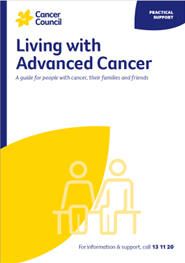- Home
- Ovarian cancer
- If ovarian cancer returns
If ovarian cancer returns
If ovarian cancer is advanced at diagnosis, it often does come back after treatment and a period of improvement (remission). This is known as a recurrence and it is why regular follow-up appointments are important.
In some cases, there may be a number of recurrences, with long gaps in between when cancer treatment is not needed. Early-stage ovarian cancer is less likely to come back than advanced ovarian cancer.
Learn more about:
- Treatments for recurrent ovarian cancer
- Living with ovarian cancer
- Tips for dealing with uncertainty
Treatments for recurrent ovarian cancer
The most common treatment for epithelial ovarian cancer that has come back is more chemotherapy or targeted therapy. The drugs used will depend on what drugs you had initially, the length of remission, and the aim of the treatment, as well as your general health and any side effects from previous treatments. The drugs used the first time may be given again if you have a good response to them and the cancer stays away for 6 months or more.
New drugs are constantly being developed and tested. Genetic tests and targeted therapy are offering new treatment options for people with ovarian cancer. Talk with your doctor about the latest developments in the treatment of ovarian cancer, and whether a clinical trial may be right for you.
Living with ovarian cancer
One of the challenges of a cancer diagnosis is dealing with uncertainty. When first diagnosed, many people want to know what’s going to happen and when it will be over. But living with uncertainty is part of having cancer, especially if the cancer is advanced.
There are some questions that there will be no answers for. Learning as much as you can about the cancer and its treatment may make you feel more in control.
Tips for living with ovarian cancer
- Talk with other people who have had ovarian cancer. You may find it reassuring to hear about their experiences.
- Explore different ways to relax, such as meditation or yoga.
- Talk to a psychologist or counsellor about how you are feeling – they may be able to teach you some strategies to help you manage your fears.
- Keep a diary to track how you’re feeling.
- Set yourself some achievable goals.
- Practise letting your thoughts come and go without getting caught up in them.
- Try to exercise regularly. Research shows that exercise can help people cope with the side effects of treatment.
- Focus on making healthy choices in areas of your life that you can control, such as eating well and getting regular exercise.
- Listen to our podcast on Managing Fear.
→ Read stories from people affected by ovarian cancer
Podcast: Living Well with Advanced Cancer
Listen to more podcasts for people affected by advanced cancer
More resources
Dr Antonia Jones, Gynaecological Oncologist, The Royal Women’s Hospital and Mercy Hospital for Women, VIC; Dr George Au-Yeung, Medical Oncologist, Peter MacCallum Centre, VIC; Dr David Chang, Radiation Oncologist, Peter MacCallum Cancer Centre, VIC; Prof Anna DeFazio AM, Sydney West Chair of Translational Cancer Research, The University of Sydney, Director, Centre for Cancer Research, The Westmead Institute for Medical Research and Director, Sydney Cancer Partners, NSW; Ian Dennis. Consumer (Carer); A/Prof Simon Hyde, Head of Gynaecological Oncology, Mercy Hospital for Women, VIC; Carmel McCarthy, Consumer; Quintina Reyes, Clinical Nurse Consultant – Gynaecological Oncology, Westmead Hospital, NSW; Deb Roffe, 13 11 20 Consultant, Cancer Council SA.
View the Cancer Council NSW editorial policy.
View all publications or call 13 11 20 for free printed copies.

